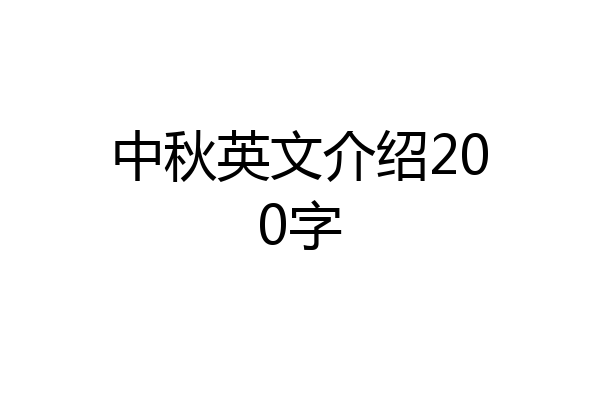
西由位门1
英文:
The Mid Autumn Festival is one of the four major traditional festivals in China.
On August 15 of the lunar calendar, it originated in ancient times, popularized in the Han Dynasty, shaped in the early years of the Tang Dynasty and prevailed after the Song Dynasty.
There are folk customs such as sacrificing the moon, appreciating the moon, eating moon cakes, playing with lanterns, appreciating osmanthus, drinking osmanthus wine and so on.
中文:
中秋节是中国四大传统节日之一,每年农历的八月十五,起源于上古时代,普及于汉代,定型于唐朝初年,盛行于宋朝以后。
有祭月、赏月、吃月饼、玩花灯、赏桂花、饮桂花酒等民俗。
别称:
中秋节有许多别称:古时有秋分夕月(拜月)的活动,故称“月夕”或“祭月节”。因节期在八月十五,所以称“八月节”、“八月半”。
因中秋节的主要活动都是围绕“月”进行的,所以又俗称“月节”;中秋节月亮圆满,象征团圆,因而又叫“团圆节”。
中秋节月亮圆满,家人团聚,出嫁的女儿回家团圆,因此又称“团圆节”、“女儿节”。在广府地区,中秋节俗称“月光诞”。仲秋时节各种瓜果成熟上市,因称“果子节”。
侗族称为“南瓜节”,仫佬族称为“后生节”等。


SmartGirl~~
The Mid-Autumn Festival, dating back to ancient China, pays homage to the moon and good harvest.During the festival, the sharing and eating of round mooncakes among family members signify the completeness and unity of families.

黑糖丸子
范文:Mid Autumn Festival, also known as Moon Festival, moonlight birthday, moon Eve, autumn festival, Mid Autumn Festival, moon worship Festival, yueniang Festival, Moon Festival and reunion festival, is a traditional festival among Chinese people.
The Mid Autumn Festival originated from the worship of celestial phenomena and evolved from the worship of the moon on autumn Eve in ancient times.
Since ancient times, the Mid Autumn Festival has folk customs such as sacrificing the moon, appreciating the moon, eating moon cakes, playing lanterns, appreciating osmanthus, drinking osmanthus wine and so on.
中秋节,又称祭月节、月光诞、月夕、秋节、仲秋节、拜月节、月娘节、月亮节、团圆节等,是中国民间的传统节日。中秋节源自天象崇拜,由上古时代秋夕祭月演变而来。中秋节自古便有祭月、赏月、吃月饼、玩花灯、赏桂花、饮桂花酒等民俗,流传至今,经久不息。

Mikewen126
fhgcfhfdc gfhfch hgfhgd gfvbhg hgfhtdgh hgfhtyfhdgdcvnnvh fgthtfgh hgfhyfghy ghhf gfhgftyf

超级吃货两枚
Mid-Autumn Festival (also known as the Moon Festival), the third major festival of the Chinese calendar, is celebrated on the 15th day of the 8th month, as the moon is supposed to be at its maximum brightness for the entire year. The moon definitely spins countless legends throughout the ages. Of course, the most famous legend is the one surrounding the "lady living in the moon" that dates back to ancient times, to a day when ten suns appeared at once in the sky. The Emperor ordered a famous archer to shoot down the nine extra suns. Once the task was accomplished, Goddess of Western Heaven rewarded the archer with a pill that would make him immortal. However, his wife found the pill, took it, and was banished to the moon as a result. Legend says that her beauty is greatest on the day of the festival. Another legend depicts a possible role that the festival played in Chinese history. Overrun by the Mongols in the thirteenth century, the Chinese threw off their oppressors in 1368 AD. It is said that mooncakes - which the Mongols did not eat - were the perfect vehicle for hiding and passing along plans for the rebellion. Families were instructed not to eat the mooncakes until the day of the festival, which is when the rebellion took place. The most lunatic mortal in Chinese history could have been the great poet Li Bai (701-762 AD), who once invited the moon to have a drink with him and his shadow to form a band of three. Li finally drowned in a lake in an effort to catch the moon when he was drunk one night. The festive night can be one of the most charming and picturesque nights and the full moon is an auspicious symbol of abundance, harmony and luck. For thousands of years, the Chinese people have related the vicissitudes of life to changes of the moon as it waxes and wanes; joy and sorrow, parting and reunion. In Chinese culture, the family represents an important circle of relations that cannot be broken. Because the full moon is round and symbolizes reunion, the festival is also known as the festival of reunion. All family members try to get together on this special day. It is a happy occasion where people feast on scrumptious mooncakes. Some Chinese families today still stay up late to observe the occasion eating mooncakes, sipping tea and gazing at the beautiful moon. It is regarded the perfect moment if someone catches the moon's reflection in the center of his or her teacup. Those who can not return home watch the bright moonlight and feel deep longing for their loved ones. --From Seven Castles Space

马云的小女儿
中秋节英文介绍如下:
The Mid-Autumn Festival falls on the 15th day of the 8th lunar month, usually in October in Gregorian calendar.
The festival has a long history. In ancient China, emperors followed the rite of offering sacrifices to the sun in spring and to the moon in autumn. Historical books of the Zhou Dynasty had had the word "Mid-Autumn". Later aristocrats and literary figures helped expand the ceremony to common people.
They enjoyed the full, bright moon on that day, worshipped it and expressed their thoughts and feelings under it. By the Tang Dynasty (618-907), the Mid-Autumn Festival had been fixed, which became even grander in the Song Dynasty (960-1279).
In the Ming (1368-1644) and Qing (1644-1911) dynasties, it grew to be a major festival of China.
月饼的英语
豆沙月饼 Red bean moonckae
莲蓉月饼 Lotus paste mooncake
五仁月饼 Five nuts mooncake
猪肉馅月饼 Pork mooncakes
蛋黄月饼 Egg yolk mooncakes
冰淇淋月饼 Ice cream mooncakes
冰皮月饼 Snow skin mooncakes
优质英语培训问答知识库